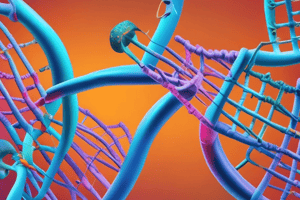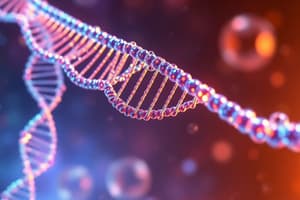Podcast
Questions and Answers
What is the function of restriction/digestion enzymes in molecular cloning?
What is the function of restriction/digestion enzymes in molecular cloning?
- To select a small carrier molecule of DNA
- To join two DNA fragments covalently
- To move recombinant DNA from the test tube to a host cell
- To cut DNA at specific sites (correct)
What is the role of a vector in molecular cloning?
What is the role of a vector in molecular cloning?
- To move recombinant DNA from the test tube to a host cell
- To join two DNA fragments covalently
- To cut DNA at specific sites
- To select a small carrier molecule of DNA capable of self-replication (correct)
What is the purpose of ligation in molecular cloning?
What is the purpose of ligation in molecular cloning?
- To move recombinant DNA from the test tube to a host cell
- To cut DNA at specific sites
- To join two DNA fragments covalently (correct)
- To select a small carrier molecule of DNA
Why do restriction enzymes provide protection to bacteria against invading viruses?
Why do restriction enzymes provide protection to bacteria against invading viruses?
What is the main characteristic of the sequences cleaved by restriction enzymes?
What is the main characteristic of the sequences cleaved by restriction enzymes?
Why are restriction enzymes used mainly in in-vitro experiments?
Why are restriction enzymes used mainly in in-vitro experiments?
What is the role of restriction/digestion enzymes in molecular cloning?
What is the role of restriction/digestion enzymes in molecular cloning?
What is the main function of a vector in molecular cloning?
What is the main function of a vector in molecular cloning?
Why are restriction enzymes used mainly in in-vitro experiments?
Why are restriction enzymes used mainly in in-vitro experiments?
What is the purpose of ligation in molecular cloning?
What is the purpose of ligation in molecular cloning?
Why do restriction enzymes provide protection to bacteria against invading viruses?
Why do restriction enzymes provide protection to bacteria against invading viruses?
What is the main characteristic of the sequences cleaved by restriction enzymes?
What is the main characteristic of the sequences cleaved by restriction enzymes?
Flashcards are hidden until you start studying
Study Notes
Molecular Cloning
Restriction/Digestion Enzymes
- Function in molecular cloning: to cleave DNA molecules at specific recognition sites, producing compatible ends for ligation
- Provide protection to bacteria against invading viruses: by breaking down viral DNA, preventing viral replication
Characteristics
- Recognize and cleave specific DNA sequences: typically 4-8 base pair palindromic sequences
- Used mainly in in-vitro experiments: to manipulate DNA in a controlled environment
Vectors
- Role in molecular cloning: to clone and replicate DNA fragments in a host organism
- Main function: to provide a mechanism for DNA replication and transmission
Ligation
- Purpose in molecular cloning: to join two DNA fragments with compatible ends, forming a recombinant DNA molecule
Studying That Suits You
Use AI to generate personalized quizzes and flashcards to suit your learning preferences.





